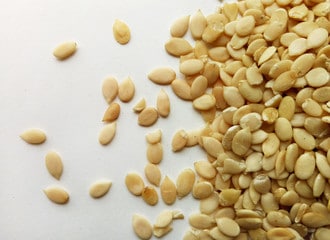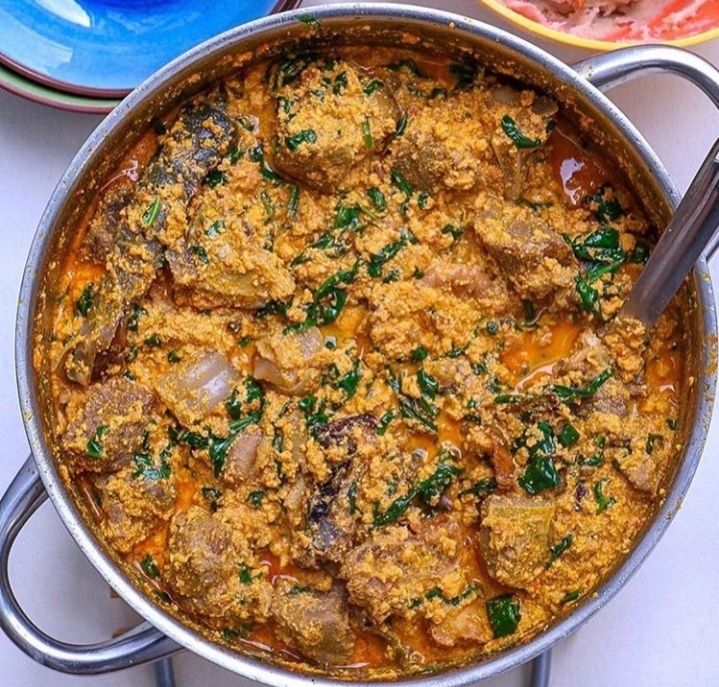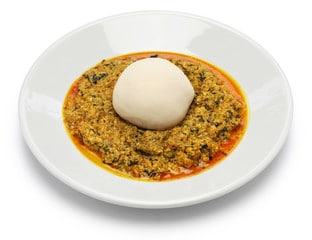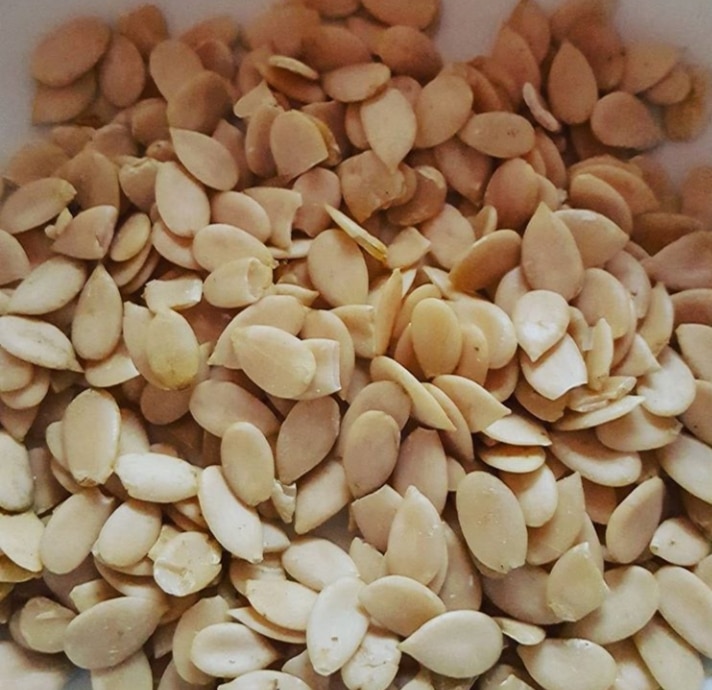Melon seed, popularly known as Egusi in Nigeria, is a food many Nigerians, irrespective of state or tribe, enjoy. The popularity of the food is beyond Nigeria as people from other West and Central African countries also enjoy a dish of Egusi.
People enjoy egusi by grinding it and using it to make soups, although the method of preparation may vary across tribes and countries. [1]
Egusi is gotten from a fruit from the Cucurbitaceae family, which the watermelon also belongs to. The botanical name of egusi is Colocynthis citrullus.
The fruit is hard and smaller than the average watermelon and has a marshy, bitter pulp that is inedible. The seeds of this fruit are what is eaten instead, after being scooped out and left to dry.
The egusi has a brown, brittle shell around it, which is broken to reveal the white seed that is the main ingredient for soup.
Nutritional Value of Egusi
Besides its great taste, egusi also has a high nutritional value, with a high oil content of up to 50%, potassium, protein, calcium, and much more.
It is also a rich source of vitamin B1, B2, sulphur, dietary fibre, zinc, magnesium, and a lot more. All these make egusi one of the healthiest foods you can eat. [2] [3]
Little wonders it is a favourite for some people. The oil extracted from Egusi seeds can be used to make butter and can also be used in the making of animal feed.
After the extraction of the oil, the used seeds are used to make a type of local snack called Robo. If the seeds are left to ferment, they turn into another local spice called ogiri.
Today, we would be looking at some of the health benefits of Egusi seeds and why you should consider consuming it more.

10 Health Benefits of Egusi Seeds
From the nutritional composition of egusi that you read above, you can deduce that there are manifold health benefits of egusi. Let’s find them out.
1. Anti-inflammatory properties
Egusi contains anti-inflammatory properties that help to reduce and prevent the effect of inflammation.
It contains methanol, which has always been used to cure and treat inflammation.
The methanol extracts help to stimulate the production of serotonin and carrageenan, which help to fight infections that could lead to inflammation. [4]
2. Improves bone health
The high concentration of calcium, phosphorus, and magnesium in egusi allows it to form and strengthen bones and teeth while fighting off diseases that could affect the bones.
Calcium is essential for the development and maintenance of strong bones. Adequate calcium intake helps prevent bone disorders such as osteoporosis
3. Aids digestion
Egusi is one food that stimulates and aids digestion and helps regulate bowel movement to the presence of soluble dietary fibre and vitamin B1.
In addition, egusi seeds can aid digestion primarily due to their high fiber content. Fiber is essential for maintaining a healthy digestive system as it adds bulk to the stool and facilitates regular bowel movements, thereby preventing constipation.
According to a review, egusi melon seed kernels contain about 3-4% fiber, making them great for digestion.
4. Improves heart health
Egusi also keeps the heart healthy and protected by reducing cholesterol levels in the blood due to the fact that it contains unsaturated fatty acids. It also has amino acids that have been known to promote cardiovascular health.
Furthermore, egusi seeds are high in unsaturated fats, particularly linoleic acid and oleic acid. These fats are known to lower LDL (bad) cholesterol levels while increasing HDL (good) cholesterol levels, thereby reducing the risk of heart disease
5. High protein content
Protein helps to build and repair the muscles and skin, and your body needs large amounts of it, which is one of the things that Egusi has a high content of.
Consuming protein also helps fight off diseases like kwashiorkor and other deficiencies associated with malnutrition.
Studies have shown that the protein content of egusi seeds is favorable when compared to other protein sources. For instance, the crude protein content of egusi melon seeds is around 23.4%, which compares well with other protein-rich foods

6. Helps to prevent and fight cancer
Several studies have shown egusi to help in fighting cancer, due to the presence of cucurbitacin glycosides, an active property that has been observed to have a pleiotropic effect, killing off cancer cells and slow their spread.
Moreover, egusi seeds contain various phytochemicals, including flavonoids and phenolic compounds, which have been identified for their potential anti-cancer properties.
These compounds can induce apoptosis (programmed cell death) in cancer cells and inhibit their growth and spread
7. Helps to manage arthritis
Eating egusi can also help those with arthritis due to the fact that it contains cucurbitacin glycosides and quercetin, two anti-arthritic properties.
If left untreated, arthritis can lead to deformities, since it destroys bones and joints.
The anti-arthritic properties contain flavonoids, which are very effective in treating and managing arthritis and related conditions.
Egusi melon seeds are a good source of essential fatty acids, including omega-3 and omega-6 fatty acids. These fatty acids have been shown to reduce inflammation and improve joint health, making them beneficial for managing arthritis
8. Improves the skin
Egusi contains vitamin B2 and Niacin, two vitamins that help maintain and improve the skin.
When extracted as oil, it can be used in the production of lotions and soaps that would keep the skin fresh and smooth.
9. Good for those with diabetes
Insulinotropic properties are found in every part of the Egusi plant, from the stem to the seeds, which could help those with diabetes, because it stimulates the response of insulin.
A study published in 2011 stated that, egusi melon seeds (Colocynthis citrullus) hs antidiabetic properties and lowers cholesterol [6]
10. Has antioxidant properties
Egusi helps get rid of toxins from the body and prevents cell damage due to the antioxidant properties it has, containing lots of vitamins and essential minerals.
This helps protect against diseases and the effects of free radicals in the body.

Bottom Line
Melon seeds or egusi are rich in essential nutrients, vitamins, and minerals. There are so many amazing health benefits of egusi, such as it’s ability to fight cancer, inflammation, and improve digestion. You can enjoy egusi by eating egusi soup. In fact, it’s one of the healthy Nigerian lunch ideas you can try.
YOU WILL ALSO LIKE TO READ…
- 7 Potent Health Benefits of Nigerian Pear (Ube)
- 8 Health Benefits of Sardines
- Health Benefits of Tapioca (Kpo Kpo garri)
- 6 Awesome Health Benefits of African Velvet Tamarind
- 7 Most Unsafe Roadside Foods in Nigeria
- 10 Healthy Vitamin D Foods In Nigeria
- 5 Healthy Seafoods in Nigeria
- 7 Healthy Raw Foods In Nigeria
- 8 Healthy Blood-Building Foods In Nigeria
- 6 Tasty and Healthy Nigerian Appetizers
- 10 Most Healthy Nigerian Snacks
Collins Nwokolo is a human physiologist, writer and health enthusiast. He loves writing helpful articles on health and fitness, which he enjoys sharing with everyone.






